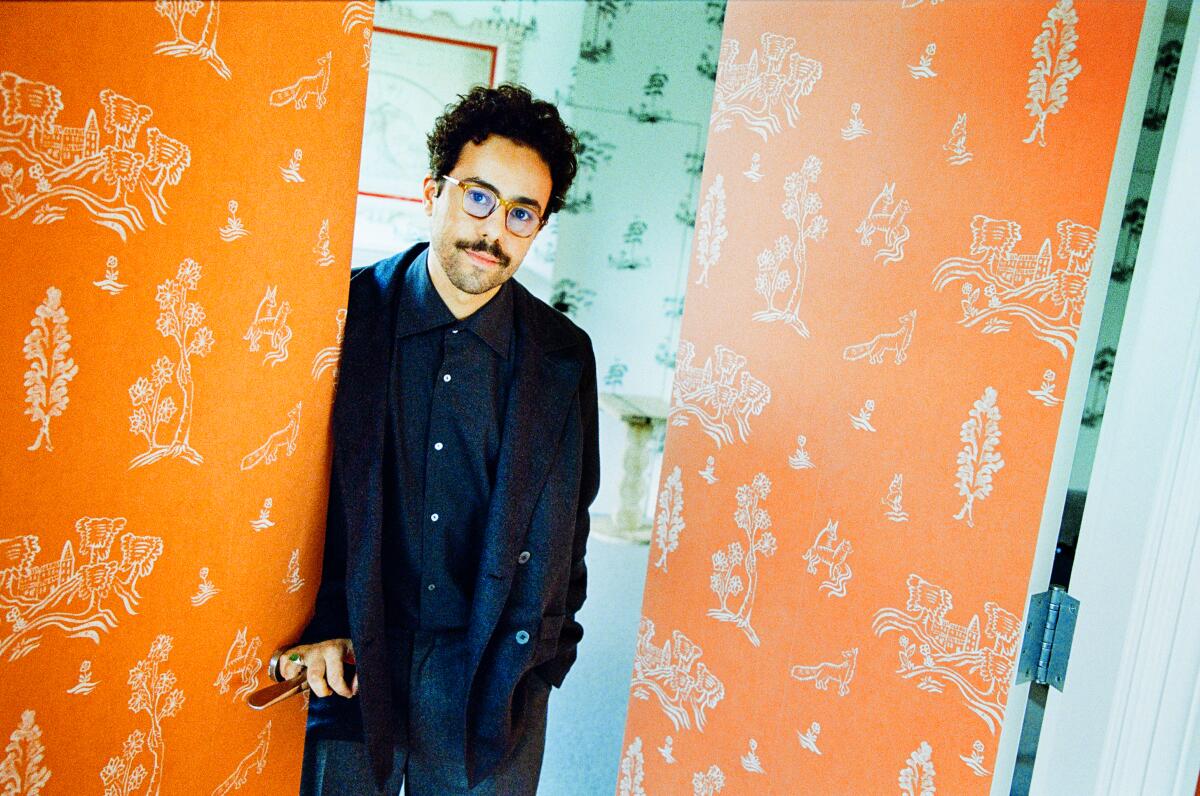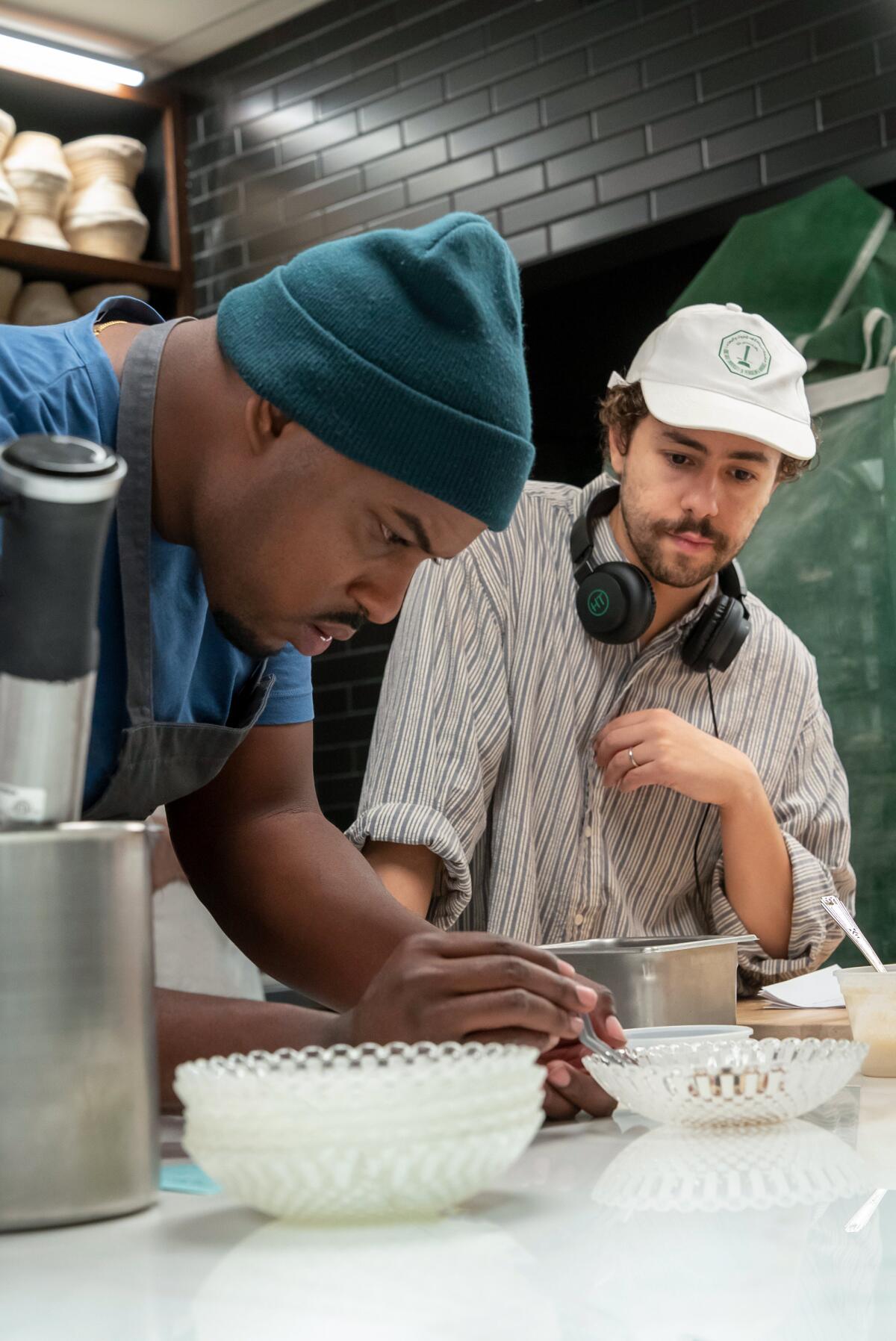He’s not just ‘Arab guy.’ Ramy Youssef makes the most of his ‘Poor Things’ role

- Share via
Ramy Youssef is a multi-hyphenate’s multi-hyphenate. A partial rundown of his current workload includes co-creating, executive producing, writing, often-directing and starring in Hulu’s “Ramy,” based loosely on his own background as the son of Egyptian immigrants living in New Jersey; co-creating and writing the Netflix series “Mo” with comedian Mohammed Amer, based loosely on Amer’s background as the son in a Palestinian family living in Texas; and co-creating, executive producing and starring in the upcoming animated Amazon series “#1 Happy Family USA,” about an immigrant Arab family trying to prove to their neighbors that they’re the best family in America. More is in the works from his Cairo Cowboy production company.
Then the part of Max McCandles in Yorgos Lanthimos’ film “Poor Things” came along.
“I’ve been in this world where I’m making all the things that I’m involved with, and the immigrant in me loves that and knows how to do that,” Youssef says via Zoom from Manhattan. “But it was such a gift to not have to advocate for myself, and then to get offered this role.”
He counts Max as his first film role, “which is a really cool way to enter the film world. It’s only downhill from here.” Long a fan of Lanthimos’ work, he was surprised that the director of “The Favourite” was a fan of his. Lanthimos called Youssef to talk about the role, the film, art and life. “Then he said, ‘I’ll send the script to you, let me know if you like it and want to be in it.’ And I said, ‘I don’t care what’s on that PDF, I’m in. I don’t drink, and I would do a beer commercial with you, that’s where I’m at with this ask.’”

The film, based on the novel by Alasdair Gray, is set in the late 1880s. Max is a British science student who falls into the orbit of mad scientist Godwin Baxter (Willem Dafoe) and Bella Baxter (Emma Stone), whom Godwin brought back from near death to a completely new life. Mark Ruffalo rounds out the core cast. “Outside of getting to work with such a great filmmaker, it was also really refreshing to be thought of for a role that’s not explicitly ‘Arab guy,’” Youssef says. “It’s like, ‘Oh, hey, I see your essence, and I think you can play something that would match the essence of the film.’”
That essence is, in a word: “curiosity.” “Bella is completely following her mental, carnal desire, without any of the preconceived shackles of a family, of a society, of a culture, of anything,” Youssef notes. “The film answers this philosophical [question]: What would I look like without my conditioning, if I wasn’t jaded, if I hadn’t been hurt? That is something I’ve always wondered and examined. Bella is that at a 10, and her curiosity really forces my character’s curiosity to grow and to step out of convention, to step out of fear.”
Working with the cast included three weeks of fearless rehearsal. “We did these wild theater games that were really intimate and fun and crazy. They created a sense of comfort and a sense of knowing each other.” And he considers Stone the funniest person he’s ever met. “I’ve been really lucky to work with comedic geniuses, but she is faster than anyone — her level of improvisation, her level of understanding, her ability to make you laugh, her ability to inhabit a character so fully and track it all. I know people who have a sense of being funny as themselves, and what’s crazy about Emma is she has that mastery of someone who’s been themself their whole life, but with a character she’s probably only been building for a year. And that’s where I’m just like, ‘Oh, you’re actually crazy. This is why Yorgos is obsessed with you, because you’re an emotional computer.’”
He likens the project to a seemingly unrelated job, directing an episode of Hulu’s “The Bear” that was set in Copenhagen. “Bear” creator Christopher Storer (who wrote on “Ramy”) and showrunner Joanna Calo are the show’s only directors but couldn’t get away to Denmark for the shoot, so they entrusted it to Youssef. “It was such a joy,” he says. “Working on ‘The Bear’ and ‘Poor Things’ were really important experiences, because in each of them I got to focus on just one of the things that I do. On ‘The Bear,’ I’m only going to focus on the directing. On ‘Poor Things,’ I’m not going to look at locations, I’m not going to think about costumes, I’m not going to think about script or any of the other things that I do. I love the amount of stuff I get to do in making my own show, or in co-creating ‘Mo,’ but I get lot of satisfaction from stepping into someone else’s playground.”
From the Oscars to the Emmys.
Get the Envelope newsletter for exclusive awards season coverage, behind-the-scenes stories from the Envelope podcast and columnist Glenn Whipp’s must-read analysis.
You may occasionally receive promotional content from the Los Angeles Times.







